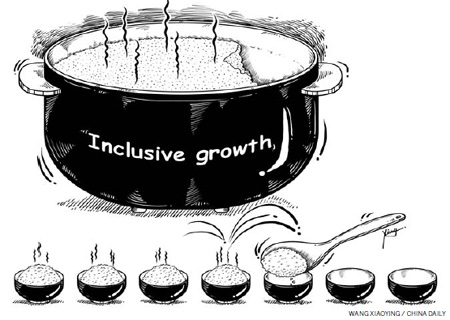Chronicle of China's unfolding ten years foretold
- By OP Rana
 0 Comment(s)
0 Comment(s) Print
Print E-mail China Daily, March 19, 2013
E-mail China Daily, March 19, 2013

The next 10 years could see the world economy go into a tizzy, wobble and then crash. The signs are there. The European Union debt crisis does not seem to end anytime soon. The United States still has no definite answer to its debt crisis or "fiscal cliff". Japan is too busy trying to clear the economic and political mess of its own making to find a foolproof way of reversing its downward economic trend. This, in brief, is the state of three of the world's four largest economies.
The next 10 years could also see the Middle East go up in flames despite the US-led West's efforts to spread democracy in the region, militant Islam become more militant, and Northeast Asia engaged in a bloody power game that could derail the established political and economic order.
In the next 10 years, rising temperatures could wreak greater havoc across the planet, scalding the land, drying up lakes and rivers, destroying crops and causing a food crisis. There could also be more hurricanes and typhoons, sandstorms and snowstorms, and of course floods.
Or, the world economy could truly recover and be back on a growth trajectory in the next 10 years. The world could be free of some of the present conflicts, with others on their way to being resolved. The world could also be less polluted and a much healthier place to live.
Whether we like it or not, China and its new leadership, headed by President Xi Jinping and Premier Li Keqiang, will play a not so minor role in what the world would look like in the next 10 years. The impact of their role on the world stage, however, will depend on how they deal with the challenges at home.
The two leaders have already given enough indications of the state of the country and the world they want to see by 2023, when they are scheduled to hand over the reins of the country to the next generation. Xi and Li have ushered in what many say is a "new style" of leadership, holding out a promise that things will for the better within China and enable it to play an influential role in world affairs.
Xi made it clear after being elected Party chief that corruption has to be rooted out of society. He wants officials to eschew the trappings that come with power. "Power", he has said, "should be restricted by the cage of regulations." That he is committed to eliminating corruption is borne out by his remark that not only "flies", but also "tigers" should be exposed and punished if they are corrupt.
Xi has also spoken out against government extravagance and waste, and called for austerity. But his austerity call, unlike in the EU, is not aimed at the people but the Party and the government. This means he wants change to come from the top rather than the bottom. This in itself is something new.
Li, with his people-first policy, has highlighted the importance of reform. For him, reform is not fast-paced economic growth, though China has to maintain a growth rate that would sustain its economy in the long run. Reform, as Xi sees it, should be aimed at narrowing the income gap and the urban-rural divide, and building a well-off society in all aspects.
There is one issue, however, that deserves greater attention of the leadership, and that is the environment. China has passed the stage when society is all about "survival values", in which people's life is just a matter of food and shelter - getting by each day. Now that most people have enough to eat and a roof over their heads, they need a better environment in the true sense of the term.
Whether the environment will improve, however, depends on whether the government can veer the economy, which used to be centered on GDP growth, toward sustainable growth. And indications are that China could grow at a slower pace and still achieve its goals. After all, its GDP has grown by 52.5 percent compared with just 2.4 percent of the United States, the world's largest economy, since the start of the banking crisis.
But because China's economy is now an integral part of the world economy, the country's leadership has to attune its moves to the changing global patterns. What if the debt crises in the EU and the US deepen and China's exports drop drastically? What if the turmoil in the Middle East boils over and there is an oil crisis? What if a conflict erupts in the Asia-Pacific region? What if the rest of the world doesn't take measures to combat climate change and the planet faces a graver environmental crisis?
It is to prevent these "ifs" from becoming reality that the Chinese leadership will focus its efforts on, because even if any one of them turns out to be true, it could hamper China's progress toward a well-off society.
The author is a senior editor with China Daily.





